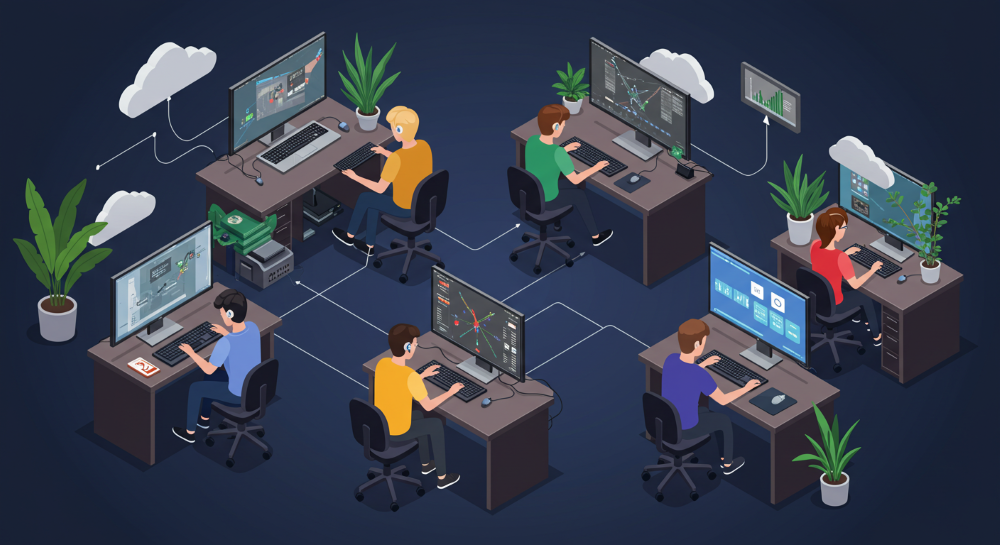DevOps in E-gaming: Best Practices for a Winning Experience




The gaming industry is evolving at a breakneck pace, with players demanding immersive experiences, frequent updates, and seamless performance. To meet these challenges, game developers are increasingly turning to DevOps practices. Let’s explore how DevOps is revolutionizing e-gaming and the best practices that can help your studio stay ahead of the game.
The main reason why DevOps matters in modern gaming is that gaming industry faces unique DevOps and infrastructure challenges:
Over the past few years, the gaming industry has experienced a digital transformation that goes far beyond enhanced graphics and immersive storylines. With titles like Pokémon Go demonstrating the necessity for robust, scalable systems during explosive user growth, DevOps practices have become essential for managing high traffic volumes and dynamic user bases. By embracing continuous integration and deployment methods, companies are able to prepare their games for spikes in demand, ensuring that they remain accessible and engaging even during periods of rapid scaling.
Cloud gaming services like Sony PlayStation Now, Google Stadia, and Nvidia GeForce Now are revolutionizing how we play games. The benefits include:
DevOps is more than a collection of tools; it is a culture that promotes collaboration, efficiency, and agility. In the context of e-gaming, the benefits are profound:
Rapid Scaling: Cloud-based solutions allow game servers to automatically adjust to fluctuating loads, optimizing resource usage and reducing costs during off-peak periods.
Enhanced Quality Assurance: Automated testing and continuous integration mean that errors are caught early, reducing the risk of game-breaking bugs and ensuring stable gameplay.
Streamlined Development: By breaking down traditional silos between developers, testers, and operations teams, DevOps fosters an environment of improved communication and faster time-to-market for new features or updates.
Cost Efficiency: Automated resource management and auto-scaling with cloud providers like AWS have proven to reduce maintenance and licensing costs significantly.
1. Embrace Containerization and Orchestration
Containerization technologies like Docker, coupled with orchestration tools such as Kubernetes, can significantly streamline game development and deployment. These tools enable developers to package game components and dependencies consistently, ensuring that games run smoothly across different environments.
2. Implement Continuous Integration and Continuous Deployment (CI/CD)
CI/CD pipelines are the backbone of efficient game development. By automating the build, test, and deployment processes, developers can:
3. Leverage Cloud Gaming Infrastructure
Cloud gaming platforms like Amazon GameLift or Google Cloud for Games provide scalable infrastructure that can handle sudden spikes in player traffic. These services offer:
4. Prioritize Real-Time Monitoring and Analytics
Implementing robust monitoring and analytics tools is crucial for maintaining game performance and player satisfaction. DevOps practices enable:
5. Implement Infrastructure as Code (IaC)
IaC allows game developers to manage and provision infrastructure through code rather than manual processes. This practice:
6. Foster a Culture of Collaboration
DevOps is not just about tools; it’s a cultural shift. Encourage collaboration between developers, artists, designers, and operations teams. This approach:
7. Automate Game Testing
Automated testing is crucial for maintaining game quality and stability. Implement automated tests for:
8. Provide Security & Compliance: Protect Players and Data
With regulations like COPPA (Children’s Online Privacy Protection Act) and GDPR, DevOps teams embed security into every pipeline stage:
9. Guarantee High Availability: No Room for Downtime
Gamers expect 24/7 access. You can use:
Looking ahead, the evolution of 5G networks and advancements in AR/VR technologies will only amplify the demands placed on e-gaming infrastructure. DevOps as a Service companies are uniquely positioned to help gaming companies navigate this future, providing expert guidance on how to implement flexible, secure, and efficient DevOps practices that can handle these challenges head-on14. Moreover, emerging trends such as cloud-based multiplayer platforms and user-generated content will require even more sophisticated DevOps solutions. Companies that embrace these practices today will be well-positioned to lead the industry tomorrow.
DevOps is no longer optional in the e-gaming industry—it’s a necessity for success in a highly competitive market. By adopting best practices such as cloud infrastructure, CI/CD pipelines, high availability strategies, automation, and security measures, gaming companies can deliver exceptional experiences that keep players coming back for more.
We specialize in DevOps as a Service, combining industry-leading best practices with tailored solutions to optimize workflows, enhance scalability, and ensure seamless infrastructure performance. We are here to transform your DevOps processes into a strategic advantage. Whether you’re scaling operations or refining deployment pipelines, our team delivers the technical expertise and proactive support for your business to thrive in competitive markets.

Learn how our experts can accelerate your business growth with DevOps as a Service offering